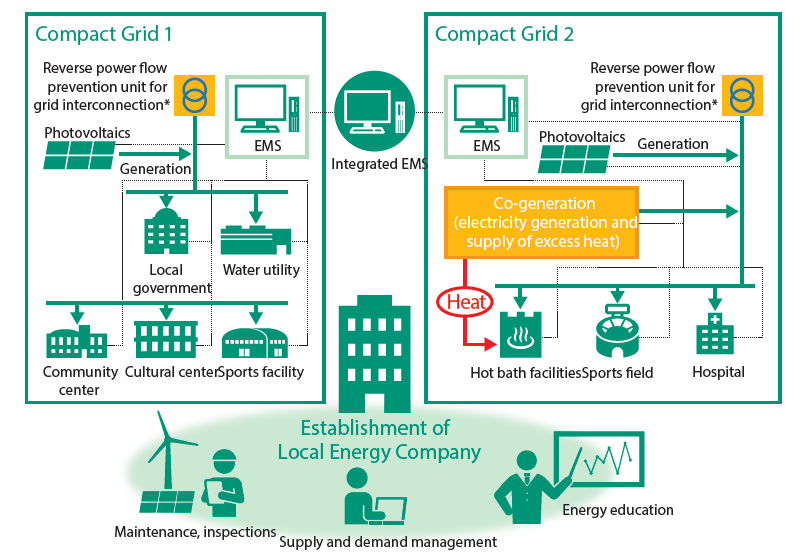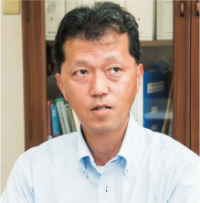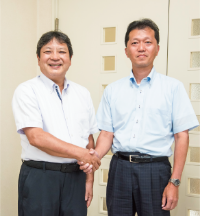Hioki Regional Energy Co., Ltd.
 *Supplies the electric power generated within the compact grids to local loads (equipment and facilities) without allowing reverse power flow back to the main grid. Accordingly, the system does not participate in any feed-in tariff (FIT) scheme.
*Supplies the electric power generated within the compact grids to local loads (equipment and facilities) without allowing reverse power flow back to the main grid. Accordingly, the system does not participate in any feed-in tariff (FIT) scheme.
These two compact grids operating in Hioki City were able to maintain a reliable supply of electric power at a lower cost than before. Along with the stimulation of the local economy provided by higher income from local taxes (a consequence of improved commercial revenues) as well as other income such as facility rents, the project also created new employment opportunities in the form of jobs in the electricity supply business that did not previously exist. Mr. Kobira had the following to say, “What struck me more than anything else after the project was up and running was how great it is to have no input costs. The profitability of retail-level operators such as the gas company that I managed for many years is at the mercy of fluctuations in the cost of supply. While we still have maintenance costs and the upfront investment in depreciating assets, we are able to use electric power that we have generated ourselves from solar power. This lack of input costs can then be passed on in the form of lower prices for users. That this is what it means to have the local production for local consumption of energy never ceases to amaze me and I am reminded again of what a boon it is.”
Mr. Oku of the company’s electricity sales department explained the advantages of compact grids and their accompanying economic benefits, “I am currently collating figures for submission to the Ministry of the Environment and the numbers I am getting for things like CO2 emission factors are much lower than before. We have also received inquiries from various other bodies wanting to visit us, including local governments and renewable energy agencies, and this leaves me with a strong sense of how high expectations are for the use of compact grids that can reduce environmental impact.”
With this ability to make use of renewable energy and in the process reducing the energy losses associated with the transmission of electric power from distant locations, compact grids are delivering genuine benefits, not only for regional economies, but also for the global environment.

As a prospect for the future, the introduction of storage batteries is currently a subject of ongoing study. The amount of electric power generated from renewable sources varies depending on factors such as sunlight hours and wind strength. If a reliable supply of continuous electric power is to be provided, including during emergencies and without being affected by this variability in generation, then some type of storage batteries for storing the generated power is necessary.
As Mr. Oku put it, “We have calculated that, were storage batteries to be available, we could increase the percentage of electricity generation from renewable energy to the 50 percent range from its current level of around 20 percent, without compromising our top-priority mission of maintaining security of supply.” Mr. Kobira added that, “The higher this percentage, the more we can reduce electricity prices, something that should further strengthen our business fundamentals.” He also spoke to the future of the business by saying that, “Lifting the renewable energy percentage to its maximum would represent the culmination of this project.” He summed up the project with the following words, “I believe that our efforts to reduce the price of energy to our customers by even one yen represent what an energy company should be. The essence of the local production for local consumption of energy lies in how it enables us to pursue this ideal, contributing to the community through our business as we do so.”
The Compact Grid of Hioki City has brought diverse benefits to the city since it commenced operation. Hitachi Power Solutions intends to continue its role in the strong partnership that supports the evolution and development of this new regional PPS that has only just got underway.

Hioki Regional Energy Co., Ltd.